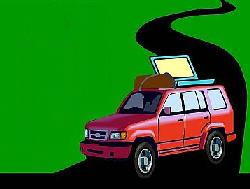| |
Remember, It's the WORLD Wide Web!
by Marcia Yudkin
Almost always, online publicity means global exposure,
whether your business is based in Peoria, Illinois, Perth,
Australia, or Paris, France. When your marketing or
publicity copy will appear on the Internet, you need to take
conscious steps to ensure that your marketing or
publicity material makes sense to readers from far corners of the world. In news releases or
text on your web site, here's how to clue in distant
customers and avoid international gaffes.
First, ground your material geographically. People outside
your region won't necessarily know what state - and country
- "Hampshire County" is in unless you say so. Likewise, you
may think that the expression "Bay Area" unambiguously refers to the San Francisco Bay Area in California, but
Tampa Bay, Florida also uses that expression. Perhaps the
most geographically useless word you could use in a headline
would be "local." Name the city and state instead.
|
Learn to Present
Teleseminars Comfortably and
Profitably
My online course, Teleteach for
Profit, gives you the straight
scoop on what you should and shouldn't do in your teleseminar program and why.
As a novice, you'll go from feeling nervous about leading an audio session to using teleseminars
confidently for generating prospective customers or as a profit center in
themselves.
Course details. |

Teleteach for Profit Course |
|
Second, avoid gratuitous and unexplained references to
political figures and national culture. During the tenure of
President Bill Clinton, many Americans referred to his wife
as simply "Hillary," with no last name. This was bound to
confuse people in other parts of the world. Similarly, those
outside the U.S. wouldn't know the expression, "Would it
play in Peoria?" Professional journalists always provide
unobtrusive background, full names for everyone mentioned
and brief explanations of laws referred to, and you should
follow suit.
Third, take great care with relative terms, such as
"overseas" or "foreign." To Europeans, the U.S. is overseas.
To Asians, the dollar is foreign currency. Similarly,
remember that acronyms everyone in your country knows, such
as "VAT" or "EPA," may need to be spelled out for the
benefit of those living elsewhere.
Fourth, watch out for tricky measurement terms. I once
mistakenly corrected the word "tonnes" in the publicity
materials of a client from Canada, thinking that the writer
meant an English ton of 2,000 pounds. In fact, a "tonne" is
a metric ton, equivalent to 2,205 pounds in the English
system. Cumbersome as this may look, it would be helpful to
indicate this as "75 tonnes (metric tons)." Consider adding English or metric conversions for some of the lesser known
measurement terms, such as hectares to acres or vice versa.
Beware also of "billion," which in the U.S. means a thousand
million, while in Great Britain it can mean a million
million.
|
Run Your Business From the Beach, Shangri-La or Anywhere
Got the urge to hit the
road? Discover tips, tools and strategies for continuing to bring in the moolah while vacationing, traveling, moving to a temporary location or living full-time in an RV.
This course resolves your "but what about..." concerns about taking off.
Be a Digital Nomad. |

Take Your Business on the
Road Course |
|
Fifth, add your country code to the beginning of telephone
or fax numbers on a news release or at your web site. A
reporter on deadline from around the world shouldn't have to
figure out whether or not (1) or some other country code has to be added to your Saskatchewan telephone number.
All of this can be accomplished without making your copy
clunky. Use common sense in deciding how many definitions or
glosses to add. Just as you'd inject explanations for dinner
guests from afar when the conversation turned to local sports or politics, add inconspicuous verbal asides to
clarify your references in material that will be accessible
to readers around the world.
Copyright 2002 Marcia Yudkin.
All rights reserved.
Read
a book about web site marketing makeovers.
Learn
more about copywriting techniques.
Commission
an objective, constructive review of your site.
|






